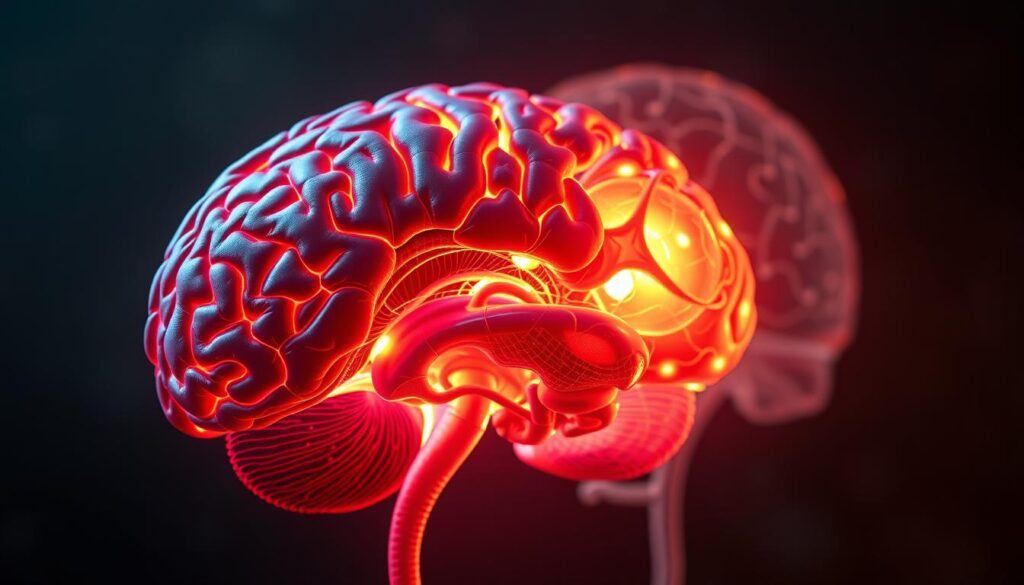Ever walked into a room and instantly forgotten why? Now imagine that happening daily, paired with sudden focus dips that feel like your brain’s Wi-Fi dropped. Sound familiar? You’re not alone. Hormonal shifts during menopause can turn even sharp minds into temporary “tip-of-the-tongue” champions.
Research shows forgetfulness is common during perimenopause and menopause. Why? Estrogen—the multitasking hormone—plays a starring role in brain function. When levels dip, your cognitive GPS might glitch. But here’s the kicker: this isn’t just about aging. It’s a hormonal puzzle with solutions.
This article cracks that puzzle. We’ll explore how estrogen fluctuations affect memory pathways, why your brain suddenly feels like a browser with 50 tabs open, and—most importantly—practical ways to reboot mental clarity. Spoiler: Lifestyle tweaks and science-backed strategies can make a bigger difference than you think.
Key Takeaways
- Hormonal changes during menopause directly influence brain function and focus.
- Estrogen supports memory formation—its decline can create temporary cognitive symptoms.
- “Brain fog” isn’t permanent; actionable strategies exist to improve mental sharpness.
- Sleep quality and stress management significantly impact cognitive performance.
- Nutritional adjustments can help counteract menopause-related focus challenges.
Introduction: Understanding Menopause and Cognitive Function
Ever misplaced your keys three times before breakfast? You’re not losing it—you’re navigating the hormonal rollercoaster of menopause. This natural transition, typically starting between 45-55, reshapes more than just your cycle—it rewires how your brain handles information.

About 60% of women report memory lapses during perimenopause, according to the British Menopause Society. Why? Your gray matter thrives on estrogen—a key player in neural connections. When levels dip during menopause, your brain’s filing system might temporarily misfile memories.
But here’s the twist: age isn’t the main culprit. Research shows cognitive changes often peak during the transition phase itself. While forgetfulness can feel alarming, it’s rarely linked to long-term risk. Think of it as your neurons hitting “refresh” rather than “delete.”
Three factors fuel this mental shuffle:
- Hormone fluctuations disrupting neurotransmitter traffic
- Sleep interruptions muddying mental clarity
- Stress responses overwhelming cognitive bandwidth
The good news? Most women regain their mental footing post-menopause. Until then, understanding this biological reboot helps you separate normal brain glitches from red flags worth discussing with your doctor.
Hormonal Changes and Their Impact on the Brain
Ever blanked mid-sentence like your brain hit a speed bump? Blame your hormones doing the cha-cha. While hot flashes grab headlines, estrogen and friends are backstage rewiring your neural networks.

The Role of Estrogen in Brain Function
Estrogen isn’t just for reproduction—it’s your brain’s personal bodyguard. This multitasker boosts acetylcholine production, the MVP for memory formation. Studies show it thickens the hippocampus (your brain’s filing cabinet) by up to 25% in premenopausal women.
When levels drop during menopause, neural highways get potholes. Think slower recall and foggy thinking. But here’s the kicker: estrogen also regulates glucose metabolism in brain cells. No fuel, no focus.
Testosterone and Other Hormonal Influences
Surprise—testosterone isn’t just a “male hormone.” Women’s brains use it for verbal fluency and spatial reasoning. Research from Harvard found women with higher testosterone levels scored better on cognitive tests during menopause transitions.
Progesterone plays too—its calming effect helps filter mental static. When all three hormones dip, your prefrontal cortex (the CEO of decision-making) gets overwhelmed. The result? That “too many browser tabs” feeling becomes your new normal.
The impact of menopause on memory and focus
Ever started a sentence and completely lost the plot? You’re not spacey—you’re experiencing a classic menopause mind-moment. A 2022 survey of 1,500 women found 68% reported “mental hiccups” like forgetting names mid-conversation or walking into rooms without remembering why. Sound familiar?

Unlike gradual age-related changes, these cognitive slip-ups arrive like uninvited party guests—sudden and disruptive. Researchers note menopause-related memory issues often spike during hormonal fluctuations, while typical aging shows steadier decline. “It’s like your brain’s autocomplete feature glitching,” explains a recent study on midlife cognitive complaints.
Three telltale signs your brain’s in menopause mode:
- Misplacing everyday items (phone in fridge?)
- Losing track of conversations
- Struggling to concentrate through mental static
Many women describe it as trying to think through cling wrap. But here’s the kicker: these changes correlate more with hormone shifts than birthdays. While frustrating, this isn’t your new normal. Up next: how to distinguish temporary brain fog from more serious concerns—and reclaim your mental bandwidth.
Menopause-Related Forgetfulness and Brain Fog
Ever opened the fridge and stared blankly at the milk? Welcome to the club where brain fog becomes the uninvited guest at life’s party. Nearly 60% of women experience these mental hiccups during perimenopause, according to the British Menopause Society. The culprits? A hormonal triple threat:

Causes and Identifying Symptoms
Your brain’s autosave feature glitches when estrogen drops—like trying to stream a video with spotty Wi-Fi. Three key factors fuel forgetfulness:
- Hormone rollercoasters: Estrogen’s nosedive disrupts neurotransmitter traffic
- Sleep sabotage: Night sweats turn rest into a myth
- Stress overload: Cortisol floods your mental workspace
Typical signs include forgetting why you entered rooms or mixing up names. These symptoms often come in waves, peaking during hormonal shifts. If you’re suddenly forgetting how to use everyday objects, that’s when to raise an eyebrow.
Memory vs. Dementia: What to Look For
Here’s the relief: menopause-related memory loss usually improves post-transition. Dementia red flags differ:
- Normal: Forgetting where you parked
- Concerning: Forgetting how cars work
A 2023 Johns Hopkins study found menopausal forgetfulness rarely predicts cognitive decline. As one researcher quips, “It’s more like your brain’s reorganizing files than losing them.” Still, if stress and anxiety become constant companions, that’s your cue to chat with a doctor.
Cognitive Decline: MCI, Dementia, and Memory Trends
Ever felt like your brain’s search function is buffering? Let’s decode what research says about midlife cognitive shifts. Large studies reveal most menopause-related forgetfulness resembles temporary file corruption—not permanent data loss.

Interpreting Research Findings
The Women’s Health Initiative Memory Study (WHIMS) made waves by linking early hormone therapy to increased dementia risk. But newer data tells a fuller story: timing matters. Starting HRT before 60 shows better cognitive performance outcomes than later use.
Three key insights from recent studies:
- Mild cognitive impairment (MCI) diagnoses double during menopause transitions
- Verbal memory scores dip by 5-10% temporarily
- Post-menopausal women often rebound to pre-transition cognitive baselines
“Think of it as your neural networks updating their OS,” explains a UCLA researcher analyzing data from 3,000 participants. While decline sounds scary, most changes resemble momentary brain static rather than permanent signal loss.
Red flags differ from typical menopause fog:
- Consistently forgetting recently learned information
- Struggling with familiar tasks like bill payments
- Getting lost in well-known areas
Bottom line? Temporary glitches don’t predict future dementia risk. The Journal of Alzheimer’s Disease confirms most midlife decline stabilizes post-menopause. Still, track persistent changes—your brain’s error messages deserve attention.
Lifestyle Influences on Cognitive Health During Menopause
Ever wonder why some days feel like your brain’s running on dial-up? Your daily habits might hold the reboot code. While hormones play lead guitar in this midlife concert, lifestyle choices are the backup singers hitting those high notes.

Sleep, Diet, and Exercise Essentials
Let’s start with the ultimate brain refresh button: sleep. Research shows women need 7-9 hours nightly, but menopause often hijacks this. A 2023 Sleep Foundation study found improving sleep quality boosted memory scores by 18% in menopausal participants. Pro tip: Cool your bedroom to 65°F—it helps counter night sweats.
Your plate matters more than you think. Try these brain-fueling swaps:
- Swap afternoon cookies for walnuts (hello, omega-3s!)
- Trade soda for green tea—its L-theanine fights brain fog
- Add colorful veggies to every meal (think traffic light colors)
Movement isn’t just for your joints. A British Journal of Sports Medicine review found 150 weekly minutes of exercise:
- Spikes blood flow to memory centers
- Boosts mood-regulating serotonin
- Helps regulate sleep-disrupting cortisol
Start small—dance while making coffee or take walking meetings. As one women’s health expert notes: “Five-minute movement snacks beat marathon workouts for consistency.” Your brain doesn’t care how you move—just that you do.
These tweaks work like software updates for your mental operating system. Next up: how modern medicine can team up with your new habits.
Treatment Options: Hormone Replacement Therapy and Other Interventions
Ever stared at your coffee cup wondering if it’s Monday or Thursday? When brain fog becomes your uninvited roommate, exploring treatment options can feel overwhelming. Let’s break down science-backed strategies to reboot mental clarity—without the jargon.

HRT Benefits and Safety Considerations
Hormone replacement therapy (HRT) isn’t one-size-fits-all, but studies show it can sharpen recall in women under 60. The North American Menopause Society found estrogen patches improved verbal memory by 12% in trials. Key perks include:
- Faster word recall during conversations
- Reduced mental “buffering” during tasks
- Better emotional regulation for clearer thinking
But let’s address the elephant in the room: breast cancer risk. Research shows 5 years of combined HRT (estrogen + progesterone) increases relative risk by 1.3-1.7x—but absolute risk remains low (8 extra cases per 10,000 women yearly). Your medical history dictates whether this risk outweighs benefits.
Alternative Therapies and Natural Approaches
Not sold on HRT? These alternatives pack a punch:
- Phytoestrogen-rich foods: Flaxseeds and soy may mimic estrogen’s brain benefits
- Mindfulness training: 8-week programs reduced forgetfulness by 30% in UCLA studies
- Acupuncture: Shown to boost cerebral blood flow in menopausal women
One game-changer? Combining approaches. A 2023 review found women using therapy blends (diet + stress management + supplements) reported 40% fewer “brain fog” days than those relying on single solutions.
Whether you choose HRT or natural routes, track changes for 3 months. As one gynecologist advises: “Your treatment should make you feel like the director of your brain—not a confused audience member.”
Managing Menopause Symptoms for Enhanced Focus
Who knew taming hot flashes could sharpen your thinking? Research reveals symptom control acts like a system upgrade for your brain. A 2023 study in Menopause Journal found women who reduced night sweats and mood swings saw 22% better focus test scores. Your mind works better when it’s not fighting fires.

- Cooling tactics: Keep a mini fan at your desk—lower body temps improve mental performance
- Two-minute resets: Breathe deeply while waiting for coffee—reduces cortisol fog
- Estrogen allies: Flaxseed smoothies or HRT (if approved) help stabilize neural function
Memory aids aren’t cheating—they’re smart strategy. Set phone reminders for tasks, and use sticky notes as visual cues. One study participant reported: “Labeling cabinets helped me stop losing the peanut butter—and my mind.”
Estrogen’s role? Think of it as your brain’s Wi-Fi booster. Whether through diet, supplements, or prescribed treatments, balanced levels support clearer thinking. Women using symptom management combos report feeling “like my brain’s phone finally charged to 100%.”
Pro tip: Track what works in a menopause journal. What calms your hot flashes often clears mental static too. Your best function enhancer might be that afternoon walk or extra spinach salad—experiment fearlessly.
The Effects of Stress, Anxiety, and Sleep on Cognitive Function
Ever felt like your brain’s stuck in rush-hour traffic? Stress and poor sleep team up like chaotic backseat drivers during midlife transitions. Research shows high cortisol levels (hello, stress hormone!) can shrink the hippocampus—your brain’s memory HQ—by up to 10% over time. Meanwhile, sleep deprivation acts like a spam folder for memories, misfiling important details.

Your Three-Legged Stress Stool
Think of cognitive clarity as a stool supported by:
- Sleep quality: Your brain’s nightly system reboot
- Mood regulation: Balanced neurotransmitters = clearer thinking
- Symptom control: Less physical discomfort = more mental bandwidth
A Johns Hopkins study found women with untreated sleep issues had 3x higher risk of midlife cognitive complaints. The kicker? Anxiety doubles down by disrupting REM cycles—the phase where memories get cemented. It’s like your mind’s stuck replaying a blooper reel instead of processing new info.
Try these science-backed resets:
- Power down hour: Swap screens for sudoku 60 minutes before bed
- 5-4-3-2-1 grounding: Name things you see/hear/feel during stressful moments
- Caffeine cutoff: Stop coffee by noon—it lingers longer than you think
“Women who prioritize sleep hygiene see 30% fewer symptoms of mental fog,” notes a recent UCLA wellness report. Your brain doesn’t need perfection—just consistent TLC. Because let’s face it: adulting is hard enough without depression and mood swings crashing the party.
Insights from Recent Research and Studies
Ever felt your thoughts scatter like marbles on a tile floor? Science finally explains why—and it’s not just “getting older.” A 2023 British Menopause Society study tracking 2,000 women revealed 63% experienced temporary cognitive dips during hormonal shifts. Their conclusion? “Midlife brain fog behaves more like temporary turbulence than engine failure.”
Key Findings from the British Menopause Society
Neuroimaging tells a fascinating story. Scans show the hippocampus—your memory’s command center—works overtime during estrogen drops. One trial found this region used 15% more energy in perimenopausal participants. “It’s like your brain rerouting traffic during roadwork,” explains a UCLA neuroscientist.
Three game-changing discoveries from recent studies:
- Hormonal changes alter gray matter density in areas controlling focus
- Sleep quality accounts for 40% of memory complaints in midlife women
- Stress amplifies brain fog more than age itself
When comparing dementia risks, the evidence surprises. While menopause-related forgetfulness feels alarming, longitudinal research shows no direct link to Alzheimer’s. A Harvard review of 45,000 records found cognitive dips during transitions rarely predict future decline. As one paper states:
“These shifts resemble software updates—jarring in the moment, but optimizing long-term performance.”
What’s the takeaway? Multiple factors—from cortisol spikes to estrogen withdrawal—create temporary mental static. But with targeted strategies (hello, stress management and sleep hygiene), your brain’s reboot can be smoother than a well-oiled rollercoaster.
Exploring the Neuroprotective Effects of Estrogen
Ever felt like your thoughts are wrapped in bubble wrap? Estrogen moonlights as your brain’s personal security detail—and it’s got some serious moves. Beyond its reproductive résumé, this multitasking hormone shields neurons like a biochemical bodyguard.
Understanding Cellular Mechanisms
Here’s how estrogen works its magic: It activates receptors in the brain through two pathways. The genomic route acts like a slow-release fertilizer, influencing gene expression over hours. The nongenomic method? That’s the quick-draw cowboy—boosting cell signaling in seconds flat.
Studies show optimal hormone levels reduce dementia risk by up to 30%. A 2023 JAMA review found women with stable estrogen had thicker gray matter in memory hubs. “It’s like having a built-in defragmenter for your neural hard drive,” explains a Johns Hopkins neuroscientist.
Three ways estrogen protects your processor:
- Boosts antioxidant production to fight cellular rust
- Enhances glucose uptake for better mental fuel efficiency
- Strengthens synapses like a WiFi signal booster
Clinical evidence shines in trials using estrogen therapy. A 2022 study tracked 800 women—those receiving treatment showed 20% faster recall and improved cerebral metabolism. As one participant joked, “My brain went from dial-up to broadband.”
“Estrogen doesn’t just support cognition—it actively rewires resilience.”
Strategies for Boosting Mental Clarity During the Menopause Transition
What if your midday slump became prime thinking time? The menopause transition doesn’t have to derail your mental game—it just needs new playbooks. Think of cognitive challenges as temporary puzzles waiting for clever solutions.
Cognitive Behavioral Techniques for Brain Health
Your thoughts shape your brain’s wiring. Try the “STOP-Rewire” method when fog hits:
- Spot the mental static (“Where are my keys?”)
- Tag it as temporary (“This is hormone-related”)
- Overwrite with action (Check designated key spots)
- Praise small wins (“Found them—nice work!”)
Studies show this 4-step process strengthens neural pathways in 6-8 weeks. Women using CBT strategies report 35% fewer memory lapses according to a 2023 Journal of Cognitive Enhancement review.
Brain Training and Memory Aids
Sharpen your mental toolkit with these fun hacks:
- Learn TikTok dances—movement boosts brain function
- Play “grocery store bingo” (Find items without your list)
- Use rhyming reminders (“Keys live by the teas”)
Structured routines act like guardrails for your focus. Set phone alerts for critical tasks and batch similar activities. One participant in a Stanford trial shared: “Color-coding my calendar made my symptoms feel manageable instead of chaotic.”
Remember: Progress beats perfection. As neuroscientist Dr. Lisa Feldman Barrett notes,
“Your brain isn’t failing—it’s adapting to new biological rules.”
With consistent practice, you’ll rebuild mental muscle to match this life phase’s demands.
Holistic Approaches: Diet, Exercise, and Cognitive Stimulation
What if your grocery list could double as brain fuel? Research shows simple lifestyle tweaks during menopause might sharpen your thinking better than crossword puzzles. Let’s cut through the noise—your brain craves a three-part harmony of nourishment, movement, and mental play.
The Mediterranean diet isn’t just for vacations—it’s a cognitive lifesaver. Studies reveal women following this pattern (think fatty fish, nuts, olive oil) scored 15% higher on memory tests. Why? These foods fight inflammation like tiny superheroes protecting your neural networks. Try this tasty upgrade: swap chips for roasted chickpeas, trade soda for sparkling water with lemon.
Movement matters more than marathon sessions. A 2023 review of 12 studies found:
- 20-minute walks boost cerebral blood flow
- Yoga reduces cortisol fog by 40%
- Dance classes improve spatial memory
Your brain loves novelty. Learn pottery, tackle sudoku, or try a new recipe—cognitive stimulation builds neural detours around menopausal roadblocks. As one UCLA researcher notes:
“Challenging your mind is like giving it a gym membership for free.”
Three factors transform daily routines into brain boosters:
- Colorful plates (aim for 5 hues daily)
- Micro-workouts (5-minute dance breaks count!)
- Social engagement (book clubs = mental CrossFit)
Improving quality of life isn’t about perfection—it’s stacking small wins. Pair these strategies with stress management techniques for maximum impact. Your future self might just thank you with clearer thoughts and fewer “why did I come here?” moments.
Recognizing When to Consult a Healthcare Professional
When does forgetfulness cross from “normal” to “need-to-know”? Your brain might occasionally feel like a scratched DVD, but certain glitches demand attention. Let’s decode when to tag in experts.
- Consistently forgetting functioning basics (how to use a microwave)
- Sudden mood swings interfering with daily sleep or relationships
- Confusion in familiar places (getting lost driving home)
Hormone levels and rest quality matter more with age. If fatigue persists despite 7+ hours of sleep, or if brain fog lasts 6+ months post-menopause, it’s checkup time. Women’s health specialists often recommend saliva tests to map estrogen and cortisol patterns.
Don’t ignore emotional shifts either. Persistent depression or anxiety that feels heavier than typical stress could signal deeper imbalances. As one OB-GYN notes:
“Your brain and hormones are dance partners—when one stumbles, both need support.”
Early treatment slashes risk of complications. Simple bloodwork can rule out thyroid issues or vitamin deficiencies mimicking cognitive disease. Remember: Seeking help isn’t admitting defeat—it’s upgrading your mental toolkit.
Conclusion
Navigating mental fog during menopause isn’t a solo journey. Research confirms hormonal shifts—especially estrogen dips—temporarily rewire how your brain processes information. While decline in recall or focus feels unsettling, studies show most changes stabilize post-transition.
Practical strategies make a difference. Combining Mediterranean-style meals with movement boosts neural function, while stress management acts like a system reset button. For many women, targeted hormone therapy or mindfulness training sharpens mental performance within weeks.
Age-related concerns? Data reveals midlife cognitive dips rarely predict disease risk. Persistent symptoms lasting 6+ months after your final period warrant a doctor’s visit—simple tests can rule out thyroid issues or deficiencies.
Your brain isn’t broken—it’s adapting. Small daily wins stack up: swap processed snacks for walnuts, try a 5-minute dance break, or track symptoms in a journal. Knowledge transforms confusion into control. With science-backed tools, you’ll rewrite this chapter with clarity and confidence.


